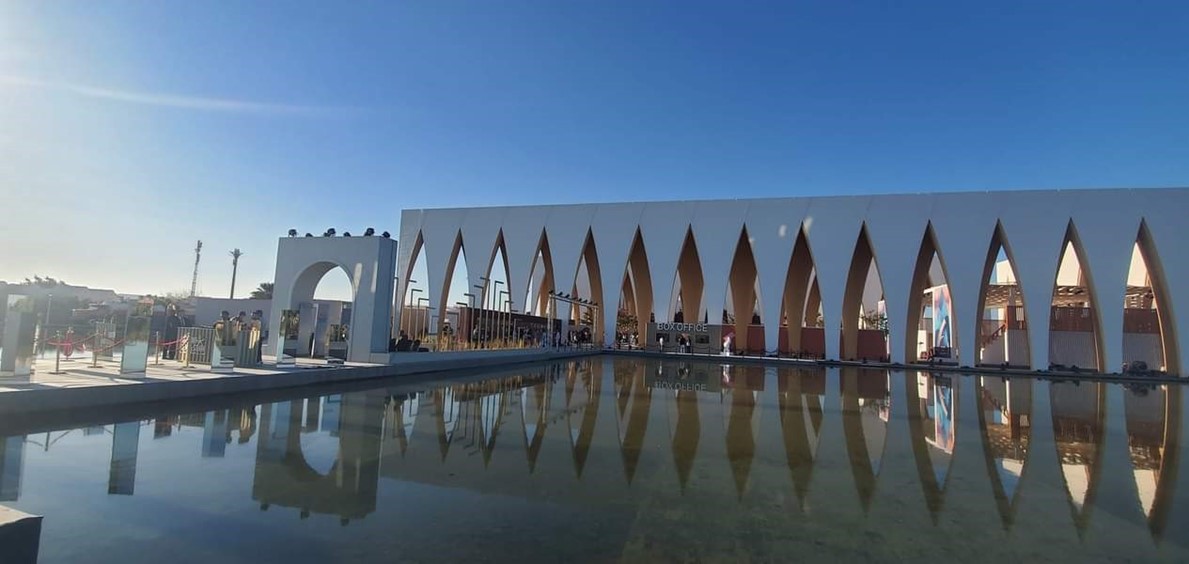As Israel’s war on Gaza
rages on, the preservation of art, culture, language, and history becomes even
more prominent in preserving Palestinian culture, cinema is one of those
avenues. This year, at
El Gouna Film Festival, the festival took more than just
showcasing diverse films but emerged as a potent advocate for justice and a
platform for the unheard.
اضافة اعلان
Festival organizers
decided to dedicate a substantial part of its program to films under the banner
“Window on Palestine” which is not just a strategic move, but a powerful
sentiment of solidarity.
The carefully curated
selection, crafted in collaboration with the
Palestine Film Institute, is a
deliberate attempt to throw open a window into the often-unseen lives and
untold stories within Palestine. “Window on Palestine” is not your typical film
showcase—it is a narrative rebellion, an effort to amplify voices that have
long been stifled and overlooked. The festival, through this program, embraces
its role as a catalyst for change, offering a stage for stories that have been
obscured by the shadows of political agendas.
The films chosen for this
program transcend the ordinary, diving deep into the heart of Palestinian
narratives. Mohamed Jabaly's "Ambulance" courageously unravels the
harrowing tales of the 2014
Gaza war, providing a raw, unfiltered perspective
on the recurring violence. Lina Soualem's "Bye Bye Tiberias" weaves a
tapestry of generational experiences, spotlighting the resilience of
Palestinian women despite the challenges posed by a dispersed identity.
In a surprising twist,
Arab & Tarzan Nasser’s "Condom Lead" takes a comedic route to
navigate the challenges faced by a married Palestinian couple during the Gaza
War. May Odeh's animated short, "Drawing for Better Dreams," showcases
the indomitable spirit of Palestinian children in the Occupied Territories,
emphasizing the profound impact of allowing young minds to hope and dream.
Yousry Nasrallah's epic
adaptation, "Bab el Shams," spans five decades of Palestinian
history, weaving a tale of suffering, hope, and love. Anne Paq & Dror
Dayan’s "Not Just Your Picture" follows German-Palestinian siblings
seeking justice after an
Israeli airstrike on Gaza. Sina Salimi’s "Roof
Knocking" confronts viewers with the paradoxical reality in Gaza, urging
contemplation on preservation amidst constant threats.
Each film in this program
is not just a story; it is a testament to the resilience of a people who refuse
to be defined by a war. Farah Nabulsi’s "The Teacher" lays bare the
daily frustrations and rage experienced by Palestinians, offering a poignant
portrayal of a life where every move is dictated by the wielders of firearms.
Abdelsalam Shehadeh's "To My Father" explores the transformative
power of photography in shaping
Palestinian and Arab history.

The festival's decision
to include
Farah Nabulsi's "The Teacher" in this powerful lineup
further solidifies the impact of the “Window on Palestine” initiative. The
film, a poignant exploration of the struggles faced by Palestinians, serves as
a stark reminder of the lived experiences beyond the headlines.
Beyond the screenings,
the festival organized a discussion—"Camera in Crisis: A Lens on
Palestine.” It features esteemed filmmakers and a Gaza-born actor who have
navigated the challenging terrain of filmmaking in crises in Palestine.
Moderated by Mohammed Almughanni, this discussion provided audiences with a
firsthand understanding of the unique challenges faced by those committed to
bringing powerful narratives to the screen.
In a statement to
Jordan
News, Marianne Khoury, the Artistic Director of the GFF, eloquently
delineates the profound significance of the “Window on Palestine” program.
Khoury emphasized, "This program not only provides audiences with a unique
opportunity to unearth or revisit the nuanced Palestinian narratives portrayed
on the screen but also invites them to engage in meaningful discussions."
Khoury's words resonate
with the notion that, in a world often marred by borders and politics, this
cinematic initiative serves as a reminder that film can function as a bridge—a
window through which we can authentically comprehend the shared human experiences
that bind us together.
In a departure from the
traditional festival format, the GFF has taken a conscious step to redirect the
spotlight onto the essence of cinema. By forgoing the usual celebrations and
festive appearances, we are prioritizing the heart of this initiative—the films
and the narratives they carry. This deliberate shift allows us to create a more
immersive and focused environment, enabling audiences to engage deeply with the
nuanced
Palestinian stories unfolding on the screen. This stripped-down
approach underscores the festival's dedication to fostering meaningful
dialogue, free from distractions and creating an environment where audiences
can truly absorb the impact of the stories being told.
Read more Entertainment
Jordan News



